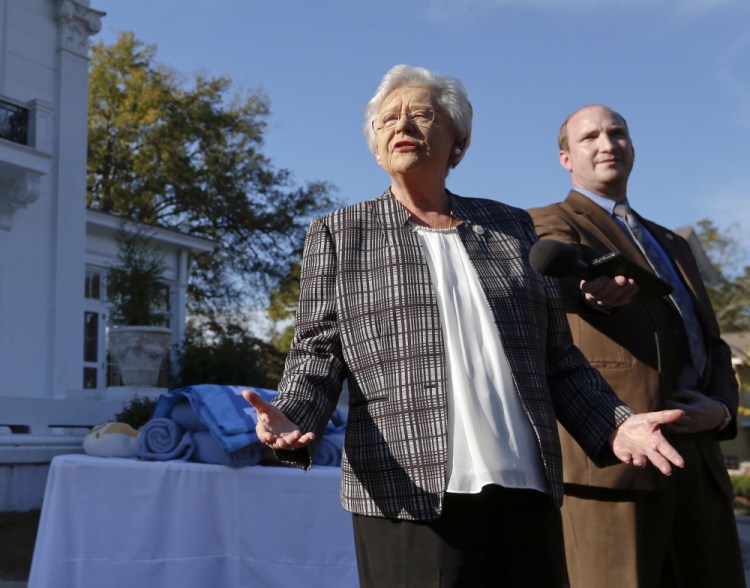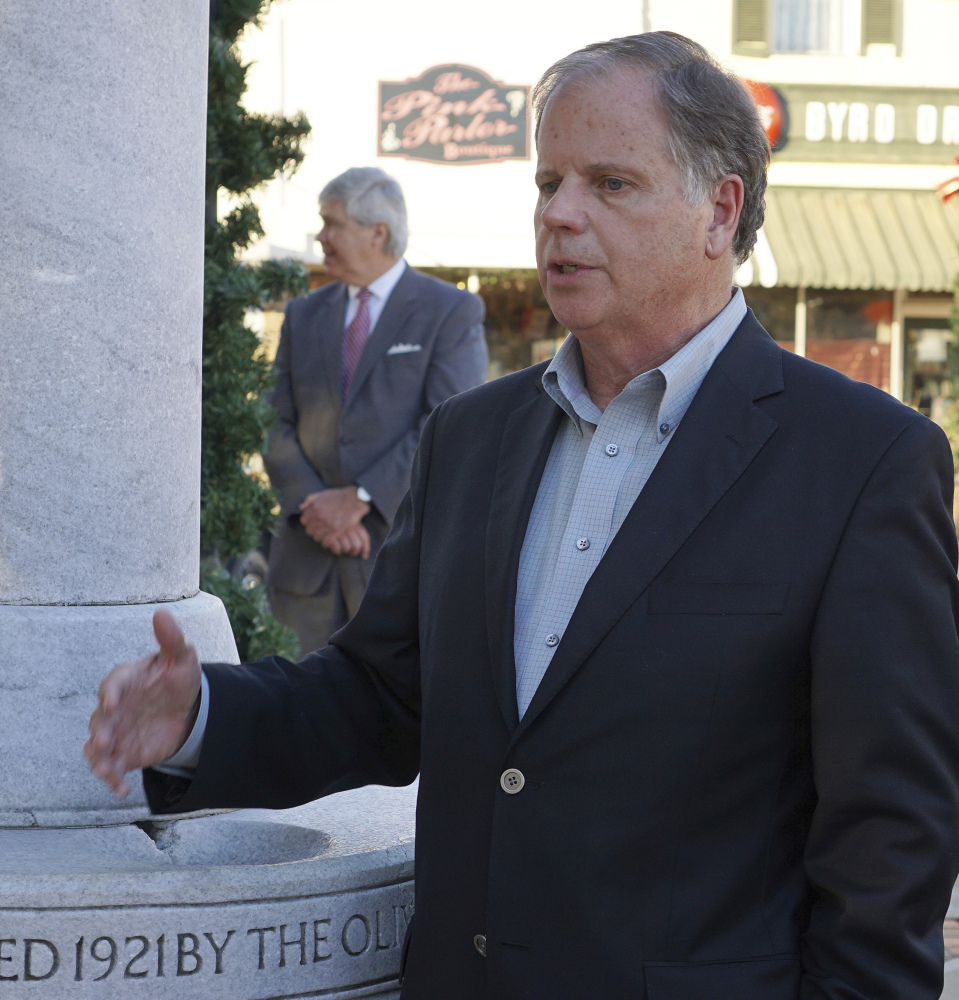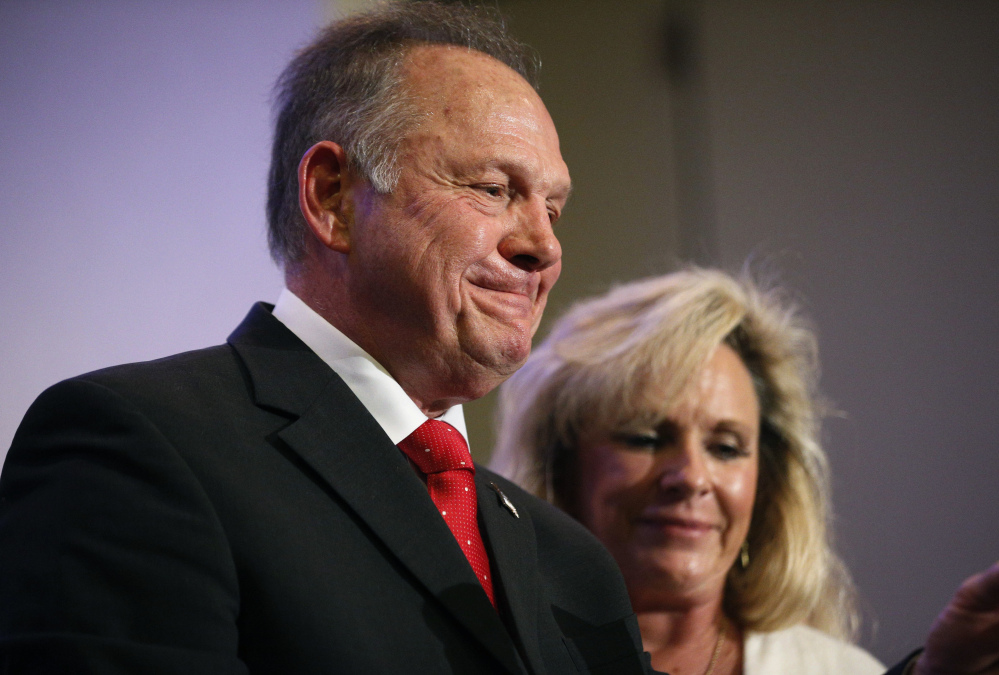BRENT, Ala. — Embattled Senate candidate Roy Moore is pinning his hopes for victory on Alabama’s long-held tradition of sharp defiance to perceived threats from forces outside the state.
That rebellious spirit, which dates to long before the state’s segregationist Gov. George Wallace became a national figure in the 1960s by railing against the “central government” in Washington, has been apparent in recent days as top state Republican officials have closed ranks around Moore amid a stream of allegations of sexual misconduct against him and calls by national party leaders for him to step aside.
Moore’s campaign has taken to repeating Alabama’s motto, written in Latin on the state coat of arms in 1923 and translated to “We dare defend our rights.” Moore backers have repeatedly argued that their state has the right to decide its own fate in the Dec. 12 special election.
“Alabamians will be the ultimate jury in this election, not the media or those from afar,” said state party chairwoman Terry Lathan.
Republican Gov. Kay Ivey said Friday she would vote for Moore despite being bothered by the accusations against him because, “I believe in the Republican Party, what we stand for, and most important, we need to have a Republican in the United States Senate to vote on things like the Supreme Court justices.”
Similar sentiments are coming from local-level Republicans such as Steve Morgan, the vice chairman of the Bibb County Republicans in rural central Alabama, who says he doesn’t know what to make of the allegations against Moore but is frustrated by the involvement of those who live outside of Alabama – starting with Senate Majority Leader Mitch McConnell, R-Ky., and other national leaders who have abandoned Moore.
“The people in Alabama don’t like to be told what to do,” said Morgan, 69, who did not support Moore in the Republican primary.
“I never liked Roy Moore,” he said. “But guess what? I’m voting for Roy Moore because I hate the stupidity that has invaded the Republican Party.”
Political tensions here have mounted over the past week as Moore’s candidacy has made Alabama the epicenter of a national debate about sexual assault, the future of the U.S. Senate, the fate of President Trump’s agenda and the direction of the Republican Party,
The Senate seat had widely been expected to remain in Republican hands when it was vacated by Jeff Sessions, who became attorney general. A Republican victory was expected even after Moore defeated the incumbent who had been appointed to replace Sessions, Sen. Luther Strange, who had the backing of Trump and other national party leaders.
Republican voters will have a decisive say in who wins. Nearly two-thirds of Alabama voters typically vote Republican, which means Democrats don’t have enough people to win statewide without Republicans either crossing over or staying home in protest.
But Moore faces a well-financed Democratic opponent, former prosecutor Doug Jones, who has tried to reach out to white Republicans with his own twist on the politics of defiance – including a television ad called “Honor” in which he narrates a Civil War battle involving a Confederate general from Alabama.
Jones, meanwhile, has largely avoided discussing the sexual-assault allegations against Moore, although one of his most recent television ads features a Republican who makes an oblique reference. “You read the story, and it just shakes you,” she says.
A Fox News poll completed after the allegations surfaced found that Jones had taken the lead with 50 percent of likely voters, compared with 42 percent for Moore. Other polls have shown the race tied or with Moore still holding on to a lead.
The Washington Post first reported Nov. 9 on four women who said Moore pursued them as teenagers, including one who said she was 14 and Moore was 32 when he touched her sexually. Two other women have since told The Post that Moore pursued them around the same time when they worked as teenagers at the mall in Gadsden, Alabama.
Another woman, represented by attorney Gloria Allred, says Moore assaulted her in a parked car when she was 16. AL.com has reported on two other women, one who says Moore groped her bottom in 1991, when she was 28 years old, and a second who says Moore asked her out in 1982, when she was a 17-year-old waitress at the Red Lobster restaurant in Gadsden.
Moore, 70, has consistently denied any sexual misconduct and has alleged that the women are part of a politically motivated plot against him. In an interview with conservative radio host Sean Hannity, Moore did not rule out the possibility that he dated teenagers older than 16, the legal age of consent, when he was in his 30s. He told Hannity he did not approve of such relationships now. “If I did, I’m not going to dispute these things, but I don’t remember anything like that,” Moore said.
The Moore campaign, which has always been anchored in his opposition to the Republican political establishment, has tried to turn the debate over the accusations into a referendum on state independence, even though the accusers are all local women. At a rally Friday, Kayla Moore, the candidate’s wife, said that the local feedback she has heard about the allegations has been supportive of her husband. “Most of the negative has been from out of state,” she said. “The people of Alabama know what is going on here.”
She was echoing her husband, who tweeted Thursday what has become the core of the campaign’s message: “This is an effort by Mitch McConnell and his cronies to steal this election from the people of Alabama and they will not stand for it!”
Moore and his surrogates regularly attack the national media and Republican leaders, arguing that there is a conspiracy to take away the rights of voters. “This is a usurpation by Mitch McConnell of the 17th Amendment that gives voters the right who we want to choose who we want in the government,” declared Ann Eubank, the leader of the Alabama Legislative Watchdogs, at a Moore campaign event in Montgomery on Friday.
Many Republicans, at least so far, are embracing that view.
In interviews with nearly two dozen Republican voters across the state, only a handful said they knew people who said they would abandon Moore altogether. Some have burrowed into the details of the accusations, denials and counterclaims like detectives, trying to suss out the truth amid a sea of online misinformation.
Josh Lambert, 23, a software developer from Centreville, spent the primary volunteering to distribute Moore signs around the county, but after the accusations surfaced, he stopped volunteering. He said he won’t vote for a Democrat who supports abortion rights, but he was unsure about his vote for Moore. “Please hold a press conference, an actual press conference, and take questions,” he said when asked whether he had a message for Moore. “It would help me as a voter.”
Others have made clear that, like the governor’s, their loyalty to the Republican Party and the prospect of another Senate vote for an antiabortion Supreme Court justice are more important.
At a Republican breakfast in Huntsville on Saturday, party leaders argued that voters should focus more on the political implications of the race than the allegations. “Doug Jones is going to vote wrong, and Roy Moore is going to vote right,” said U.S. Rep. Mo Brooks, who ran against Moore in the primary.
Send questions/comments to the editors.





Success. Please wait for the page to reload. If the page does not reload within 5 seconds, please refresh the page.
Enter your email and password to access comments.
Hi, to comment on stories you must . This profile is in addition to your subscription and website login.
Already have a commenting profile? .
Invalid username/password.
Please check your email to confirm and complete your registration.
Only subscribers are eligible to post comments. Please subscribe or login first for digital access. Here’s why.
Use the form below to reset your password. When you've submitted your account email, we will send an email with a reset code.